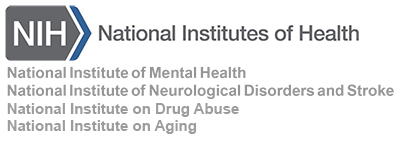Immunomodulatory Role of Complement Proteins in the Neuropathology Associated with Opiate Abuse and HIV-1 Co-Morbidity.
| Title | Immunomodulatory Role of Complement Proteins in the Neuropathology Associated with Opiate Abuse and HIV-1 Co-Morbidity. |
| Publication Type | Journal Article |
| Year of Publication | 2017 |
| Authors | Mahajan, SD, Aalinkeel, R, Parikh, NU, Jacob, A, Cwiklinski, K, Sandhu, P, Le, K, Loftus, AW, Schwartz, SA, Quigg, RJ, Alexander, JJ |
| Journal | Immunol Invest |
| Volume | 46 |
| Issue | 8 |
| Pagination | 816-832 |
| Date Published | 2017 Nov |
| ISSN | 1532-4311 |
| Keywords | AIDS-Associated Nephropathy, Cadaver, Cells, Cultured, Comorbidity, Complement Activation, Complement System Proteins, Cytokines, Frontal Lobe, Heroin Dependence, HIV Infections, HIV-1, Humans, Immunomodulation, Inflammation Mediators, Microglia, tat Gene Products, Human Immunodeficiency Virus, Up-Regulation |
| Abstract | The complement system which is a critical mediator of innate immunity plays diverse roles in the neuropathogenesis of HIV-1 infection such as clearing HIV-1 and promoting productive HIV-1 replication. In the development of HIV-1 associated neurological disorders (HAND), there may be an imbalance between complement activation and regulation, which may contribute to the neuronal damage as a consequence of HIV-1 infection. It is well recognized that opiate abuse exacerbates HIV-1 neuropathology, however, little is known about the role of complement proteins in opiate induced neuromodulation, specifically in the presence of co-morbidity such as HIV-1 infection. Complement levels are significantly increased in the HIV-1-infected brain, thus HIV-induced complement synthesis may represent an important mechanism for the pathogenesis of AIDS in the brain, but remains underexplored. Anti-HIV-1 antibodies are able to initiate complement activation in HIV-1 infected CNS cells such as microglia and astrocytes during the course of disease progression; however, this complement activation fails to clear and eradicate HIV-1 from infected cells. In addition, the antiretroviral agents used for HIV therapy cause dysregulation of lipid metabolism, endothelial, and adipocyte cell function, and activation of pro-inflammatory cytokines. We speculate that both HIV-1 and opiates trigger a cytokine-mediated pro-inflammatory stimulus that modulates the complement cascade to exacerbate the virus-induced neurological damage. We examined the expression levels of C1q, SC5b-9, C5L2, C5aR, C3aR, and C9 key members of the complement cascade both in vivo in post mortem brain frontal cortex tissue from patients with HAND who used/did not use heroin, and in vitro using human microglial cultures treated with HIV tat and/or heroin. We observed significant expression of C1q and SC5b-9 by immunofluorescence staining in both the brain cortical and hippocampal region in HAND patients who abused heroin. Additionally, we observed increased gene expression of C5aR, C3aR, and C9 in the brain tissue of both HIV-1 infected patients with HAND who abused and did not abuse heroin, as compared to HIV negative controls. Our results show a significant increase in the expression of complement proteins C9, C5L2, C5aR, and C3aR in HIV transfected microglia and an additional increase in the levels of these complement proteins in heroin-treated HIV transfected microglia. This study highlights the a) potential roles of complement proteins in the pathogenesis of HIV-1-related neurodegenerative disorders; b) the combined effect of an opiate, like heroin, and HIV viral protein like HIV tat on complement proteins in normal human microglial cells and HIV transfected microglial cells. In the context of HAND, targeting selective steps in the complement cascade could help ameliorating the HIV burden in the CNS, thus investigations of complement-related therapeutic approaches for the treatment of HAND are warranted. |
| DOI | 10.1080/08820139.2017.1371891 |
| Alternate Journal | Immunol Invest |
| PubMed ID | 29058550 |

